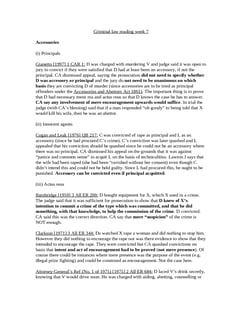Judgement for the case Fagan v MPC
Table Of Contents
KEY POINTS
-
The concept of unintentional battery is considered when the car is driven onto the policeman's foot.
The issue of mens rea is raised, contemplating whether the subsequent inception of intent can transform the original unintentional act into a willful assault.
This raises the question of whether the delayed action in removing the car demonstrates a conscious choice to harm the police officer.
The case hinges on the legal interpretation of intent and the consequences of delayed action in the commission of the alleged assault.
FACTS
-
David Morris (‘Police Constable’), aiming to question Vincent Martel Fagan (‘Defendant driver’) instructed him to park his vehicle precisely against the kerb. In response, the Defendant drove his car onto the police constable's foot.
Despite repeated commands to "get off my foot," the Defendant eventually reversed the car off the constable's foot.
The Defendant was initially convicted by the justices of assaulting a police constable in the execution of his duty.
-
Upon appealing to quarter sessions, it was acknowledged that there was uncertainty about whether the initial act of driving onto the foot was intentional or accidental.
However, the quarter sessions were unequivocally convinced that, beyond all reasonable doubt, Defendant knowingly, provocatively, and unnecessarily allowed the wheel to remain on the police constable's foot after being instructed to drive off.
Based on these facts, an assault was deemed to be proven.
-
In the subsequent appeal, the argument was presented that, according to the justices' findings, the initial act of driving onto the foot could not constitute an assault.
The contention was that the act of mounting the foot concluded without any mens rea (intent), and therefore, there was no act committed by the Defendant that could serve as the actus reus (criminal act).
JUDGEMENT
The appeal was dismissed, with Bridge J. in dissent.
In cases where an assault involves a battery, the infliction can occur through the use of a weapon or instrument controlled by the offender.
While the elements of actus reus and mens rea must coexist in an assault, mens rea doesn't have to be present at initiating actus reus. Mens rea can be superimposed on an existing act, provided it continues.
The defendant's driving his car onto the policeman's foot constituted an unintentional battery. However, the subsequent delay in removing the car transformed this unintentional act into a criminal act from the moment the necessary intention to inflict unlawful force was formed.
The judgment, per curiam, established that an assault encompasses any intentional—or possibly reckless—act that causes another person to apprehend immediate and unlawful personal violence.
Contrary to this, Bridge J. dissented, asserting that there was no act committed by the appellant after driving the car onto the police constable's foot that could constitute an assault.
COMMENTARY
In the case involving Police Constable David Morris and Defendant Vincent Martel Fagan, Fagan drove his car onto the constable's foot, initially resulting in an assault conviction.
Despite Fagan's appeal questioning the intentional nature of the act, quarter sessions confirmed an assault charge, emphasizing Fagan's deliberate and unnecessary delay in removing the car.
The subsequent appeal, challenging the finding that the initial act lacked mens rea and, therefore, wasn't an actus reus, was dismissed, with Bridge J. in dissent.
The judgment established key legal principles, clarifying that assault involving a battery can occur with a controlled instrument. It highlighted that mens rea need not be present at the start of actus reus and can be added to a continuing act.
Fagan's initial act was an unintentional battery, evolving into a criminal act with the delayed intention to inflict unlawful force.
ORIGINAL ANALYSIS
A man accidentally drove his car onto a policeman’s foot and then intentionally refused to move.
He was convicted of battery and his appeal was dismissed.
James CJ
-
Said that battery:
Could be effected via a weapon, which in this case was a car;
The mens rea was superimposed on the actus reus, shown by the fact that once the car was on the policeman’s foot the ignition was switched off and stated his intention to keep the car there;
The crime of battery was created once mens rea was superimposed onto the continuing action.
Bridge CJ
-
Disagreed with the other two judges, saying that simply there was no point at which the actus reus and mens rea coincide and that there was an intent once the guilty act was complete is irrelevant:
Why was the act continuing, simply because its consequences continue? The act itself, surely was complete.
For Further Study on Fagan v MPC

Criminal Law notes fully updated for recent exams at Oxford and Cambrid...
Need instant answers? Our AI exam tutor is here to help.
Ask questions 🙋 Get answers 📔 It's simple 👁️👄👁️
Our AI is educated by the highest scoring students across all subjects and schools. Join hundreds of your peers today.
Get StartedRelated Product Samples
These product samples contain the same concepts we cover in this case.
| Criminal Law | Homicide Notes (20 pages) |
| Criminal Law | Mens Rea — Intention Recklessness And Negligence Notes (24 pages) |
| Criminal law | Offences Against The Person Notes Real Notes (28 pages) |

 Since 2010, Oxbridge Notes has been a trusted education marketplace, supplying high-quality materials from top achievers at universities like Oxford, Cambridge, LSE, Harvard, and Yale.
Since 2010, Oxbridge Notes has been a trusted education marketplace, supplying high-quality materials from top achievers at universities like Oxford, Cambridge, LSE, Harvard, and Yale.